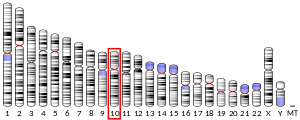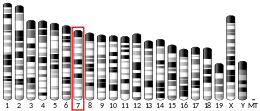Neuropeptide S
| NPS | |||||||||||||||||||||||||
|---|---|---|---|---|---|---|---|---|---|---|---|---|---|---|---|---|---|---|---|---|---|---|---|---|---|
| Identifiers | |||||||||||||||||||||||||
| Aliases | NPS, neuropeptide S | ||||||||||||||||||||||||
| External IDs | MGI: 3642232 HomoloGene: 106066 GeneCards: NPS | ||||||||||||||||||||||||
| |||||||||||||||||||||||||
| |||||||||||||||||||||||||
| Orthologs | |||||||||||||||||||||||||
| Species | Human | Mouse | |||||||||||||||||||||||
| Entrez | |||||||||||||||||||||||||
| Ensembl | |||||||||||||||||||||||||
| UniProt | |||||||||||||||||||||||||
| RefSeq (mRNA) | |||||||||||||||||||||||||
| RefSeq (protein) | |||||||||||||||||||||||||
| Location (UCSC) | Chr 10: 127.55 – 127.55 Mb | Chr 7: 135.26 – 135.27 Mb | |||||||||||||||||||||||
| PubMed search | [3] | [4] | |||||||||||||||||||||||
| Wikidata | |||||||||||||||||||||||||
| |||||||||||||||||||||||||
| Neuropeptide S | |||||||||
|---|---|---|---|---|---|---|---|---|---|
| Identifiers | |||||||||
| Symbol | Neuropeptide_S | ||||||||
| Pfam | PF14993 | ||||||||
| |||||||||
Neuropeptide S (NPS) is a neuropeptide found in human and mammalian brain, mainly produced by neurons in the amygdala and between Barrington's nucleus and the locus coeruleus, although NPS-responsive neurons extend projections into many other brain areas.[5][6][7] NPS binds specifically to a G protein-coupled receptor, NPSR.[8][9] Animal studies show that NPS suppresses anxiety and appetite, induces wakefulness and hyperactivity, including hyper-sexuality, and plays a significant role in the extinction of conditioned fear.[10][11][12][13][14][15][16] It has also been shown to significantly enhance dopamine activity in the mesolimbic pathway,[16] and inhibits motility and increases permeability in neurocrine fashion acting through NO in the myenteric plexus in rats and humans.[17]
Synthetic ligands
The non-peptide NPS receptor antagonist SHA-68 blocks the effects of NPS in animals and is anxiogenic.[18] Several peptide derived NPS agonists and antagonists have also been developed.[19][20][21][22][23]
Peptide sequence
Below are the sequences of mature neuropeptide S in several representative species in which it is expressed:
| species | sequence | MW |
|---|---|---|
| human | SFRNGVGTGMKKTSFQRAKS |
2187.5 |
| rat | SFRNGVGSGVKKTSFRRAKQ |
2210.5 |
| mouse | SFRNGVGSGAKKTSFRRAKQ |
2182.5 |
| dog, chimp | SFRNGVGTGMKKTSFRRAKS |
2215.6 |
| chicken | SFRNGVGSGIKKTSFRRAKS |
2183.5 |
| consensus | SFRNGVGxGXKKTSFxRAKx |
N/A |
References
- 1 2 3 GRCh38: Ensembl release 89: ENSG00000214285 - Ensembl, May 2017
- 1 2 3 GRCm38: Ensembl release 89: ENSMUSG00000073804 - Ensembl, May 2017
- ↑ "Human PubMed Reference:".
- ↑ "Mouse PubMed Reference:".
- ↑ Xu YL, Gall CM, Jackson VR, Civelli O, Reinscheid RK (Jan 2007). "Distribution of neuropeptide S receptor mRNA and neurochemical characteristics of neuropeptide S-expressing neurons in the rat brain". The Journal of Comparative Neurology. 500 (1): 84–102. doi:10.1002/cne.21159. PMID 17099900.
- ↑ Jüngling K, Seidenbecher T, Sosulina L, Lesting J, Sangha S, Clark SD, Okamura N, Duangdao DM, Xu YL, Reinscheid RK, Pape HC (Jul 2008). "Neuropeptide S-mediated control of fear expression and extinction: role of intercalated GABAergic neurons in the amygdala". Neuron. 59 (2): 298–310. doi:10.1016/j.neuron.2008.07.002. PMC 2610688. PMID 18667157.
- ↑ Meis S, Bergado-Acosta JR, Yanagawa Y, Obata K, Stork O, Munsch T (2008). Grothe B, ed. "Identification of a neuropeptide S responsive circuitry shaping amygdala activity via the endopiriform nucleus". PLoS One. 3 (7): e2695. doi:10.1371/journal.pone.0002695. PMC 2442874. PMID 18628994.

- ↑ Reinscheid RK, Xu YL (Dec 2005). "Neuropeptide S and its receptor: a newly deorphanized G protein-coupled receptor system". The Neuroscientist. 11 (6): 532–8. doi:10.1177/1073858405276405. PMID 16282594.
- ↑ Reinscheid RK (2008). "Neuropeptide S: anatomy, pharmacology, genetics and physiological functions". Results and Problems in Cell Differentiation. 46: 145–58. doi:10.1007/400_2007_051. PMID 18204825.
- ↑ Xu YL, Reinscheid RK, Huitron-Resendiz S, Clark SD, Wang Z, Lin SH, Brucher FA, Zeng J, Ly NK, Henriksen SJ, de Lecea L, Civelli O (Aug 2004). "Neuropeptide S: a neuropeptide promoting arousal and anxiolytic-like effects". Neuron. 43 (4): 487–97. doi:10.1016/j.neuron.2004.08.005. PMID 15312648.
- ↑ Reinscheid RK, Xu YL (Nov 2005). "Neuropeptide S as a novel arousal promoting peptide transmitter". The FEBS Journal. 272 (22): 5689–93. doi:10.1111/j.1742-4658.2005.04982.x. PMID 16279934.
- ↑ Okamura N, Reinscheid RK (Aug 2007). "Neuropeptide S: a novel modulator of stress and arousal". Stress. 10 (3): 221–6. doi:10.1080/10253890701248673. PMID 17613937.
- ↑ Leonard SK, Dwyer JM, Sukoff Rizzo SJ, Platt B, Logue SF, Neal SJ, Malberg JE, Beyer CE, Schechter LE, Rosenzweig-Lipson S, Ring RH (May 2008). "Pharmacology of neuropeptide S in mice: therapeutic relevance to anxiety disorders". Psychopharmacology. 197 (4): 601–11. doi:10.1007/s00213-008-1080-4. PMID 18311561.
- ↑ Rizzi A, Vergura R, Marzola G, Ruzza C, Guerrini R, Salvadori S, Regoli D, Calo G (May 2008). "Neuropeptide S is a stimulatory anxiolytic agent: a behavioural study in mice". British Journal of Pharmacology. 154 (2): 471–9. doi:10.1038/bjp.2008.96. PMC 2442439. PMID 18376418.
- ↑ Vitale G, Filaferro M, Ruggieri V, Pennella S, Frigeri C, Rizzi A, Guerrini R, Calò G (Dec 2008). "Anxiolytic-like effect of neuropeptide S in the rat defensive burying". Peptides. 29 (12): 2286–91. doi:10.1016/j.peptides.2008.08.014. PMID 18793688.
- 1 2 Mochizuki T, Kim J, Sasaki K (May 2010). "Microinjection of neuropeptide S into the rat ventral tegmental area induces hyperactivity and increases extracellular levels of dopamine metabolites in the nucleus accumbens shell". Peptides. 31 (5): 926–31. doi:10.1016/j.peptides.2010.02.006. PMID 20156501.
- ↑ Wan Saudi WS, Halim MA, Rudholm-Feldreich T, Gillberg L, Rosenqvist E, Tengholm A, Sundbom M, Karlbom U, Näslund E, Webb DL, Sjöblom M, Hellström PM (Oct 2015). "Neuropeptide S inhibits gastrointestinal motility and increases mucosal permeability through nitric oxide". Am J Physiol Gastrointest Liver Physiol. 309 (9): G625–34. doi:10.1152/ajpgi.00104.2015. PMID 26206857.
- ↑ Okamura N, Habay SA, Zeng J, Chamberlin AR, Reinscheid RK (Jun 2008). "Synthesis and pharmacological in vitro and in vivo profile of 3-oxo-1,1-diphenyl-tetrahydro-oxazolo[3,4-a]pyrazine-7-carboxylic acid 4-fluoro-benzylamide (SHA 68), a selective antagonist of the neuropeptide S receptor". The Journal of Pharmacology and Experimental Therapeutics. 325 (3): 893–901. doi:10.1124/jpet.107.135103. PMC 2583099. PMID 18337476.
- ↑ Roth AL, Marzola E, Rizzi A, Arduin M, Trapella C, Corti C, Vergura R, Martinelli P, Salvadori S, Regoli D, Corsi M, Cavanni P, Caló G, Guerrini R (Jul 2006). "Structure-activity studies on neuropeptide S: identification of the amino acid residues crucial for receptor activation". The Journal of Biological Chemistry. 281 (30): 20809–16. doi:10.1074/jbc.M601846200. PMID 16720571.
- ↑ Camarda V, Trapella C, Calo G, Guerrini R, Rizzi A, Ruzza C, Fiorini S, Marzola E, Reinscheid RK, Regoli D, Salvadori S (Feb 2008). "Synthesis and biological activity of human neuropeptide S analogues modified in position 2". Journal of Medicinal Chemistry. 51 (3): 655–8. doi:10.1021/jm701204n. PMID 18181564.
- ↑ Camarda V, Trapella C, Calo' G, Guerrini R, Rizzi A, Ruzza C, Fiorini S, Marzola E, Reinscheid RK, Regoli D, Salvadori S (Oct 2008). "Structure-activity study at positions 3 and 4 of human neuropeptide S". Bioorganic & Medicinal Chemistry. 16 (19): 8841–5. doi:10.1016/j.bmc.2008.08.073. PMID 18793857.
- ↑ Guerrini R, Camarda V, Trapella C, Calò G, Rizzi A, Ruzza C, Fiorini S, Marzola E, Reinscheid RK, Regoli D, Salvadori S (Jan 2009). "Synthesis and biological activity of human neuropeptide S analogues modified in position 5: identification of potent and pure neuropeptide S receptor antagonists". Journal of Medicinal Chemistry. 52 (2): 524–9. doi:10.1021/jm8012294. PMC 2653091. PMID 19113861.
- ↑ Camarda V, Rizzi A, Ruzza C, Zucchini S, Marzola G, Marzola E, Guerrini R, Salvadori S, Reinscheid RK, Regoli D, Calò G (Feb 2009). "In vitro and in vivo pharmacological characterization of the neuropeptide s receptor antagonist [D-Cys(tBu)5]neuropeptide S". The Journal of Pharmacology and Experimental Therapeutics. 328 (2): 549–55. doi:10.1124/jpet.108.143867. PMC 2630366. PMID 18971372.



